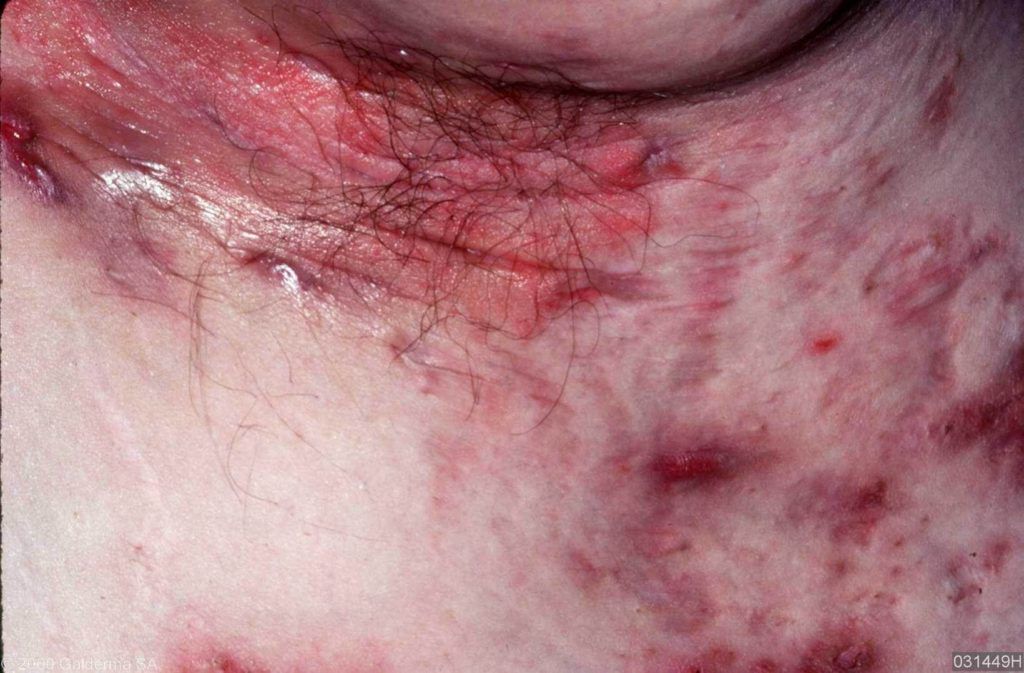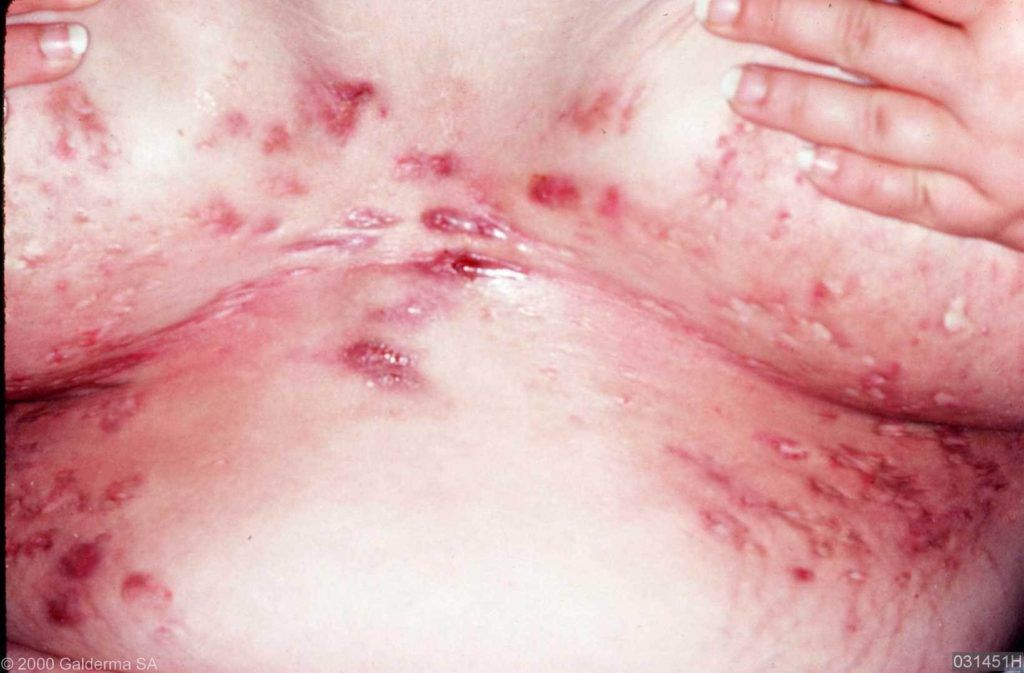Winkelwagen
U heeft geen artikelen in uw winkelwagen
Multiple comorbidities are associated with hidradenitis suppurativa, and persistent HS often results in complications. The most common comorbidities include obesity, metabolic syndrome, inflammatory bowel disease, and spondyloarthropathy. Notable complications include infection, scarring with associated restricted limb mobility, obstructed lymph drainage, fistulas, and social isolation.
A 31-year-old African American male with a five-year history of hidradenitis suppurativa presented to the emergency department for an abscess of the right neck. The patient complained of dysphagia, food intolerance, and headaches. The patient was febrile and stated that the abscess is draining and painful. His medical history was negative for illicit drug use, sexually transmitted disease, or trauma. His blood pressure was 120/65 mmHg, respiratory rate was 17 breaths/min, heart rate was 116 beats/min, the temperature was 100.5°F, and oxygen saturation was 98% on room air. Physical examination showed a large neck abscess extending from the right mastoid to the anterior neck with tenderness and some scalp drainage (Figures (Figures1, 1 , ,2 2 ).
A CT scan of the neck with IV contrast revealed fluid collection with a thick, peripherally enhancing rim in the soft tissues of the right posterior neck (Figure (Figure3). 3 ). The abscess extended from the superficial soft tissues of the right occipital region and traveled inferiorly and anteriorly to the approximate level of the thyroid. Soft tissue edema was noted up to the level of the sternoclavicular joint (Figure (Figure4). 4 ). Nodular thickening was also observed in the right and left posterior scalp soft tissues along with persistent cervical lymphadenopathy. An incidental finding of mucosal thickening in the maxillary sinus was noted. The patient was started on vancomycin 1500 mg in 500 mL IV.
While this condition cannot be cured, your dermatologist will create a treatment plan that can:
When creating a treatment plan, your dermatologist considers the types of bumps and sores you have, whether you have pain or an infection, and how the condition is affecting your life. This allows your dermatologist to customize a treatment plan for your needs.
Your treatment plan may include one or more of the following:
Some soaps and other skin care products may irritate skin with hidradenitis suppurativa. To reduce irritation, your dermatologist can create a skin care plan for you. This plan may include using an antibacterial wash and switching to a gentle antiperspirant.
If you have nodules (hard lumps beneath your skin), cysts (lumps that may contain pus, oil, or another substance), or abscesses (infected lumps that contain pus), your dermatologist may prescribe:
Apply this medication exactly as prescribed.
Resorcinol cream: This is a peel that can open clogged hair follicles and reduce inflammation.
When used to treat hidradenitis suppurativa, it has been shown to decrease pain, swollen areas that contain pus, and the lumps beneath the skin. It takes about 3 to 4 months to see the effects. For this medication to be effective, you may need to continue using resorcinol for some weeks after you see clearing.
When stronger treatment is needed, your dermatologist may prescribe one of the following medications:

Healthline has strict sourcing guidelines and relies on peer-reviewed studies, academic research institutions, and medical journals and associations. We only use quality, credible sources to ensure content accuracy and integrity. You can learn more about how we ensure our content is accurate and current by reading our editorial policy.

HS is a progressive inflammatory disease. There's no known cure for HS, but treatment can help prevent flare-ups and stop disease progression.
There are many options for treating HS naturally, including making dietary changes, supplementing with turmeric and zinc, smoothing aloe vera on irritated skin, taking Epsom salt baths, and making lifestyle changes such as quitting smoking. These can help relieve symptoms and prevent flare-ups.
Always talk with your healthcare provider before starting any new treatment to determine if it's the right fit for you.
Verywell Health uses only high-quality sources, including peer-reviewed studies, to support the facts within our articles. Read our editorial process to learn more about how we fact-check and keep our content accurate, reliable, and trustworthy.
By Cory Martin
Martin is the author of seven books and a patient advocate who has written about her experiences with lupus and multiple sclerosis.
